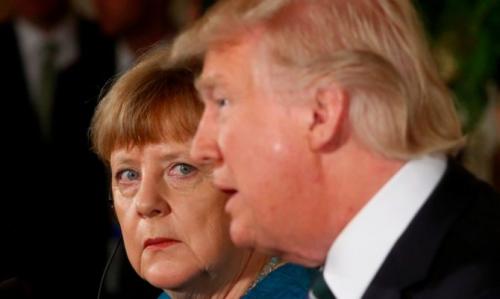
French diplomats and pundits admit to confusion over US President Donald Trump’s goals and opinions about NATO. An essay goes on to pose multiple questions and suggests that longstanding US allies such as France do not expect clear answers, with analysts wondering whether Trump deliberately presents two stances, one specifically for his followers and another for the world at large. “No sooner had he proclaimed his love of NATO, he demanded that Europe reimburse its associated debts to the United States,” explains Guy Sorman for France-Amérique. “But NATO does not bill for its services.” Leaders can only conclude that the president who relies on non-traditional media sources and exaggerates may not be a reliable partner. Sorman concludes that the French and other Europeans should “design a new, coordinated defense without the United States as soon as possible.” – YaleGlobal
France-Amérique: NATO and the Trump Enigma
The French government and its diplomats in the United States are increasingly confused. What exactly does Trump want? What does he really think about Europe and NATO? Are the answers to be found in his violently anti-European and anti-NATO campaign statements? In his equally aggressive tweets? Or perhaps in his praise of NATO upon meeting Angela Merkel in Washington?
No sooner had he proclaimed his love of NATO, he demanded that Europe reimburse its associated debts to the United States. But NATO does not bill for its services. The allies make their troops available to the organization, including for missions involving the safety of American citizens — as was the case in Afghanistan. It is therefore difficult to understand the different arguments put forward by Trump. One possible explanation is that the POTUS is presenting two parallel stances. The first is ultra-nationalistic and aimed at his voters, while the other is fit for international consumption. The hypothesis is rational, but hardly reassuring.
If Trump is irrational, then it spells even more trouble. The U.S. commitment to protect Europe and contribute to international security came about almost by chance in 1945, at a time when the United States found itself as the only real global power. But before World War II when there was no serious threat to the U.S.A. — which is once again the case since the fall of the U.S.S.R. — the spontaneous trend in American diplomacy was isolationism.
Are we currently witnessing a revival in isolationist feeling in the United States? And was this trend not set in motion when Obama refused to commit ground troops to Ukraine or Syria? In any case, Trump wholeheartedly agrees. This long succession of events should incite the French and the Europeans to design a new, coordinated defense without the United States as soon as possible.

